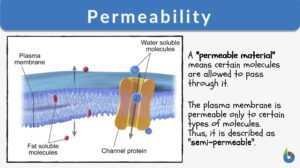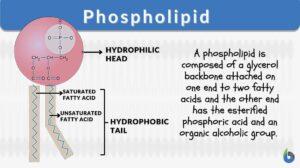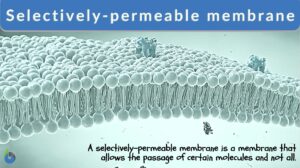Search Results for: permeability
Permeability
Permeability Definition What is permeability? In earth science, its definition is this: "the ability of any material such... Read More
Selective permeability
Definition noun A feature and a function of the plasma membrane that is essential to maintain homeostasis by regulating the... Read More
Generation of resting membrane potential
Stephen H. WrightDepartment of Physiology, College of Medicine, University of Arizona, Tucson, Arizona 85724... Read More
Capillary permeability
Definition noun The property or capability of capillary walls to allow the selective flow of substances and cells into and... Read More
Cell membrane permeability
Cell membrane permeability a quality of cell membranes which permits the passage of solvents and solutes into and out of... Read More
Glycocalyx
What is the Glycocalyx? The glycocalyx is a polysaccharide-based gel-like, highly hydrous cellular thin layer, covering... Read More
Movement of Molecules Across Cell Membranes
Diffusion Diffusion is essentially the movement of molecules from a region of higher concentration to a region of lower... Read More
Impermeability
Definition noun The state or quality of a substance being impermeable or impassable, especially to fluids. Supplement Word... Read More
Cell membrane
Cell Membrane Definition Just like any non-living body possesses a plastic or paper packaging material that keeps the... Read More
Fluid mosaic model
Fluid Mosaic Model Definition What is the fluid mosaic model? The fluid mosaic model is a three-dimensional representation... Read More
Tight junction
What are tight junctions? Tight junctions are the intercellular barrier between two neighboring endothelial and epithelial... Read More
Plasma membrane
Do all cells have a plasma (or cell) membrane? Yes, all cells have a biological membrane that separates the protoplasm from... Read More
Kidneys and Regulation of Water and Inorganic Ions
Renal Functions Kidneys remove/add substances from/to the plasma.Regulate water concentration, inorganic ion... Read More
Hypertonic
Hypertonic Definition Hypertonic is a term used to describe an entity being in the state of hypertonicity, where there is a... Read More
Vascular permeability
Definition noun The ability of blood vessel wall to allow small molecules (such as ions, water and nutrients) and whole... Read More
Thermophile
Thermophiles Definition What are thermophiles? Let us first understand the literal meaning of the word ‘thermophile’.... Read More
Electroporation
Definition noun, plural: electroporations A non-chemical method that transfers the genetic material into the recipient cell... Read More
Hydrophilic
Hydrophilic Definition What does a hydrophile (or hydrophilic molecule) mean? If a molecule is “water-loving”, it is... Read More
Fibrinous exudate
What Is Fibrinous Exudate? Fibrinous exudate is a type of exudate (inflammatory fluid) that forms at the site of tissue... Read More
Ligand gated ion channels
Ligand gated ion channel a transmembrane ion channel whose permeability is increased by the binding of a specific ligand,... Read More
Phospholipid
What is a phospholipid? Phospholipids are a subgroup of lipids. Other major types of lipids are fatty acids, sphingolipids,... Read More
Amphipathic
Amphipathic Definition Amphipathic is a word used to describe a chemical compound containing both polar (water-soluble) and... Read More
Hyperosmotic
Hyperosmotic Definition What is hyperosmotic? The word hyperosmotic is derived from two Greek words: 'hyper', meaning... Read More
Selectively-permeable membrane
Selectively Permeable Membrane Definition We can define selectively permeable membranes as those that are selectively... Read More
Hemorrhagic exudate
Definition noun A type of exudate that is bloody because of the large component of red blood cells released from ruptured... Read More
Axon terminal
An axon terminal is any of the button-like endings of axons through which axons make synaptic contacts with other nerve... Read More
Erythrocyte
Erythrocyte Definition Erythrocytes (red blood cells or RBCs) are the myeloid series of specialized cells that play an... Read More
Chromomere
Definition noun, plural: chromomeres (genetics) One of the beadlike granules that are arranged in a linear series along the... Read More
Cellobiose
Definition noun plural: cellobioses cel·lo·bi·ose, ˌsɛləʊˈbaɪəʊz A disaccharide made up of two glucose... Read More
Animal cell
An animal cell is the fundamental functional unit of life of animals. It is also the basic unit of reproduction. Animal... Read More
Cell Structure
The interior of human cells is divided into the nucleus and the cytoplasm. The nucleus is a spherical or oval-shaped... Read More
Soil horizon
Soil horizon A distinct layer of soil, more or less parallel with the soil surface, having similar properties such as... Read More
Protein Activity and Cellular Metabolism
Protein Binding Sites The ability of various molecules and ions to bind to specific sites on the protein surface forms the... Read More
Homeostatic Mechanisms and Cellular Communication
Homeostasis is the relatively stable conditions of the internal environment that result from compensatory regulatory... Read More
Permanent Tattoo Means Permanent Immune Action Of Macrophages
Have you ever wondered why a permanent tattoo seemed to last forever? A simple assumption would be is that the ink could... Read More
Phagocytosis
Phagocytosis Definition Phagocytosis is a basic physiological cellular process wherein a cell ingests a solid particle... Read More



























